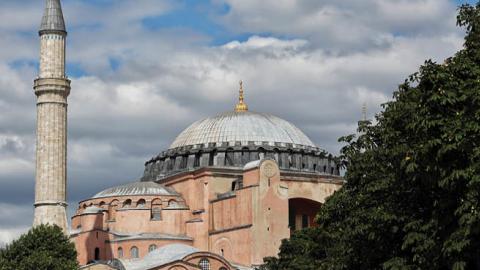As many expected and feared, the magnificent church of Justinian I, the Hagia Sophia, will again be converted to a mosque. On July 10, Turkey’s Council of State annulled the 1934 presidential decree that made it into a museum and ruled that the Turkish government has the authority to convert the former church and now museum. Almost immediately, President Recep Tayyip Erdoğan signed a decree transferring jurisdiction of the building to Turkey’s Religious Affairs Directorate, removing its museum status. The official conversion ceremony may take place on July 15, since Erdoğan called for prayers on that day in remembrance of the 2016 failed coup attempt against him.
The previous Tuesday, the ecumenical patriarch, based in Istanbul, warned that its conversion would cause a break between the East and West. “[It is] absurd and harmful that Hagia Sophia, from a place that now allows two people to meet us and admire its greatness, can again become a reason for contrast and confrontation… [It] is the symbolic place of encounter, dialogue, solidarity and mutual understanding between Christianity and Islam.” The previous Wednesday, US Secretary of State Mike Pompeo urged Turkey to maintain the site “as an exemplar of its commitment to respect the faith traditions and diverse history that contributed to the Republic of Turkey, and to ensure it remains accessible to all.” The Russian Orthodox Church expressed regret, stating it could lead to “greater divisions,” and the foreign minister of Cyprus called it a “flagrant violation” against “a universal symbol of the Orthodox faith.”
The Hagia Sophia (“Holy Wisdom”) church was built in AD 537 during the reign of Roman/Byzantine Emperor Justinian I. It was the pinnacle of Byzantine architecture and probably the world’s largest building. Until 1453, it served as the seat of the Eastern Orthodox ecumenical patriarch. After the Ottomans’ sack of Constantinople that year, it was converted to a mosque. Then, under the very secular Kemal Ataturk, it was converted to a museum. In 1985, UNESCO designated it as a World Heritage Site. Only hours before the announcement, UNESCO called on Turkey to avoid changing the “outstanding universal value” of the site and requested “prior notification,” signaling that it could change the Hagia Sophia’s status on the World Heritage List. In 2019, it was Turkey’s most visited tourist attraction, attracting 3.7 million visitors.
It is not as though Istanbul needs another mosque. As any visitor to the city knows, it has many very large and very beautiful mosques. Just across Sultanahmet Square from the Hagia Sophia lies the Sultan Ahmed Mosque, also known as the Blue Mosque. In size and architecture, it is reminiscent of its neighbor and actually combines many of its Byzantine elements with traditional Islamic architecture. At least five former Byzantine churches in Turkey dedicated to the Holy Wisdom have been reopened as mosques.
Hagia Sophia’s conversion is the culmination of Erdoğan’s long campaign to transform Turkey into a neo-Ottoman state or even empire. In 2016 there were Muslim prayers in the building for the first time since 1931, and there have been periodic Islamic prayers there since. On March 31, 2018, Erdoğan himself recited the first verse of the Quran there, dedicating his words to the “souls of all who left us this work as inheritance, especially Istanbul’s conqueror.”
Erdoğan’s reference to the conqueror of then Constantinople, Mehmet II, was quite deliberate and illustrates his desire to imitate the Ottoman sultan. As part of its reopening under the COVID-19 pandemic, Turkey had planned to reopen its mosques on June 12, but Erdoğan pushed for the reopening to take place on May 29 instead, the 567th anniversary of Constantinople’s capture by the sultan. Hence, the mosques’ reopening would also be a celebration of the act of conquest. The first Friday prayers celebrating their reopening would be in Sultan Ahmet Square next to the Hagia Sophia, on the same date and in the same location where thousands gathered to pray for the Hagia Sophia’s conversion. On May 28, Erdoğan stated on television that “Al-Fath surah will be recited and prayers will be done at Hagia Sophia as part of the conquest festival.”
This campaign is itself part of Erdoğan’s wider campaign to recapture the Ottoman Empire’s lost glory. Apart from increased repression at home, Turkey has established military bases in Qatar and Somalia, deployed armed drones in northern Cyprus, made repeated military incursions into Syria and Iraq, and has likely made covert weapons shipments to terrorists in Nigeria. It occupies the territory of a European Union member, Cyprus. It bought the Russian S-400 air defense missile system against the wishes of the US, and reportedly tested it against US-made F-16 fighter jets in November 2019.
Turkey has also intervened militarily in Libya in support of the Government of National Accord (GNA) against rebel General Khalifa Haftar. Russia is supporting Haftar, among others, which means that Turkey and Russia, while trading arms, are fighting a proxy war in Libya. In November 2020, UN-backed Libyan leader Fayez al Sarraj and Erdogan signed a deal laying claim to mineral and other rights in the Eastern Mediterranean, which has led to conflict with Egypt. Turkey is laying claim to Cypriot territorial waters and attempting to block a pipeline agreement between Greece and Israel. If Turkey can control Libya, it could control most Eastern Mediterranean hydrocarbons.
In May, Erdoğan wrote to President Donald Trump, urging that the two countries reconcile. The US should insist that any reconciliation depends up Turkey changing its behavior and curtailing its imperial ambitions.
Read in Providence Magazine



















